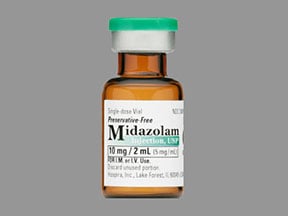
Midazolam Hcl (pf) Coupons & Savings Card – Discount Prices from $1.01
Midazolam is prescribed prior to surgical procedures to induce drowsiness, reduce anxiety, and minimize memory of the event. It is also utilized in assisting anesthesia or in sedating patients requiring mechanical ventilation. The drug functions by soothing the brain and nerves and is classified under benzodiazepines.
Our coupons are free to use. Before paying, show the pharmacist your Midazolam Hcl (pf) savings card to get your free discount. Use our filters below to edit the prescription box to match your needs. The Midazolam Hcl (pf) prices will update based on your prescription needs. Above our Midazolam Hcl (pf) coupons, you can change your location to see pharmacy prices and costs in other areas. We're here to help you buy Midazolam Hcl (pf) at the lowest price with our prescription discount card.
My prescription
Edit
2ML of 10MG/2ML, Midazolam Hcl (pf) (1 Syringe)
Select pharmacy

CVS
$19.92
COUPON PRICE
Walmart
$1.01
COUPON PRICE
Albertsons
$4.92
COUPON PRICE
Walgreens
$4.92
COUPON PRICEMidazolam Hcl (pf) savings card
Show this card to your pharmacist
Walmart
$1.01
BIN
ID
PCN
GRP
019876
LH994EA7D0
CHIPPO
LHX
Powered by
Midazolam is prescribed prior to surgical procedures to induce drowsiness, reduce anxiety, and minimize memory of the event. It is also utilized in assisting anesthesia or in sedating patients requiring mechanical ventilation. The drug functions by soothing the brain and nerves and is classified under benzodiazepines.
Our coupons are free to use. Before paying, show the pharmacist your Midazolam Hcl (pf) savings card to get your free discount. Use our filters below to edit the prescription box to match your needs. The Midazolam Hcl (pf) prices will update based on your prescription needs. Above our Midazolam Hcl (pf) coupons, you can change your location to see pharmacy prices and costs in other areas. We're here to help you buy Midazolam Hcl (pf) at the lowest price with our prescription discount card.
Midazolam Hcl (pf) dosage forms
Use our Midazolam Hcl (pf) 1ML of 5MG/ML coupon with prices from $1.01 for 1 Vial. You can also use our Midazolam Hcl (pf) 1ML of 5MG/ML coupon with prices from $1.01 for 2 Vials. We have a Midazolam Hcl (pf) 1ML of 5MG/ML coupon with prices from $1.01 for 3 Vials. You can use our Midazolam Hcl (pf) 2ML of 10MG/2ML coupon with prices from $1.01 for 1 Vial.
Dosage Quantity Price from Per unit 1ML of 5MG/ML 1 Vial $1.01 $1.01 1ML of 5MG/ML 2 Vials $1.01 $0.51 1ML of 5MG/ML 3 Vials $1.01 $0.34 2ML of 10MG/2ML 1 Vial $1.01 $1.01 2ML of 2MG/2ML 1 Vial $1.01 $1.01 2ML of 2MG/2ML 2 Vials $1.01 $0.51 2ML of 2MG/2ML 3 Vials $1.01 $0.34 2ML of 10MG/2ML 2 Vials $1.01 $0.51 2ML of 10MG/2ML 3 Vials $1.01 $0.34 5ML of 5MG/5ML 1 Vial $1.01 $1.01
| Dosage | Quantity | Price from | Per unit |
|---|---|---|---|
| 1ML of 5MG/ML | 1 Vial | $1.01 | $1.01 |
| 1ML of 5MG/ML | 2 Vials | $1.01 | $0.51 |
| 1ML of 5MG/ML | 3 Vials | $1.01 | $0.34 |
| 2ML of 10MG/2ML | 1 Vial | $1.01 | $1.01 |
| 2ML of 2MG/2ML | 1 Vial | $1.01 | $1.01 |
| 2ML of 2MG/2ML | 2 Vials | $1.01 | $0.51 |
| 2ML of 2MG/2ML | 3 Vials | $1.01 | $0.34 |
| 2ML of 10MG/2ML | 2 Vials | $1.01 | $0.51 |
| 2ML of 10MG/2ML | 3 Vials | $1.01 | $0.34 |
| 5ML of 5MG/5ML | 1 Vial | $1.01 | $1.01 |
| 5ML of 5MG/5ML | 2 Vials | $1.01 | $0.51 |
| 5ML of 5MG/5ML | 3 Vials | $1.01 | $0.34 |
